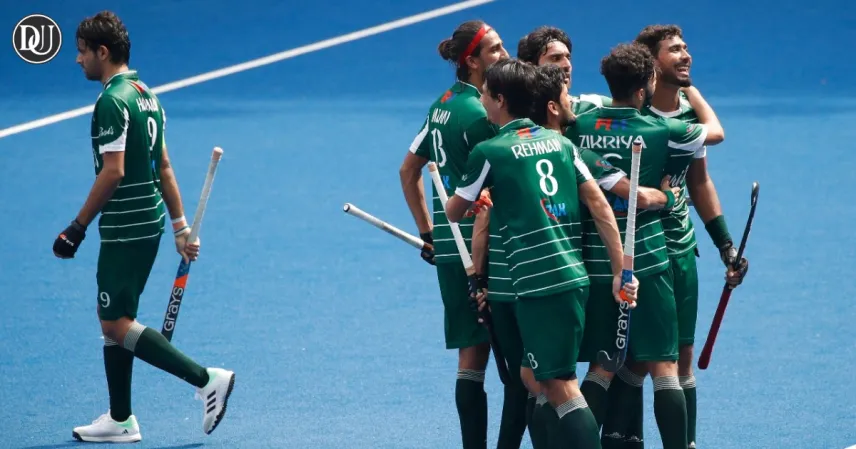Pakistan isn't sending its hockey teams to India for the Asia Cup and Junior World Cup, according to government sources – that just hit me. Honestly, it's one of those things you sort of expect, given the history, but it always feels like a punch to the gut for sports fans, you know? Like, we always hope sports can be this neutral ground, a place where rivalries stay on the field, but nope.
🚫 The Latest Hurdle
It feels like we’ve been here before. Remember that report, not too long ago, that Pakistan was actually considering sending their teams? The New Indian Express even reported back in July about them reviewing security threats to potentially send teams for both the Asia Cup and the World Cup. It gave you a little flicker of hope, didn't it? That maybe, just maybe, things were softening. But then, boom. The Hindu reported this week, citing government sources, that Pakistan won't be sending their teams. It's final, apparently. No hockey, no cross-border sports diplomacy, at least not with these teams, for now. It's a real shame, if you ask me.
🔄 A Familiar Back-and-Forth
This isn't just a one-off decision, of course. It's part of a much larger, frankly exhausting, cycle. India and Pakistan have this really deep, competitive hockey rivalry, legendary even. But political tensions always seem to cast a long shadow over it. One minute there's talk of visas, security clearances, bilateral series, the next it’s all off the table. The Times of India, for instance, had already reported the Pakistan government was unlikely to allow teams to travel, even before The Hindu's definitive confirmation. It’s like a constant push-pull. You hear positive murmurs, then the inevitable setback. It makes you wonder if we'll ever see these teams consistently play each other on each other's soil again. I mean, truly.
🤔 Security Concerns or Something Else?
When the official line comes out, it often points to security concerns. And look, genuine security threats are absolutely valid. No one wants to put players or staff at risk. But honestly, how much of this is pure security, and how much is it... well, something else? Political posturing? A reflection of deeper diplomatic freezes? It’s hard to say definitively from the outside, but my gut tells me it's rarely just about security when these decisions are made. There’s a certain level of geopolitical chess being played, and sports, unfortunately, sometimes get caught in the crossfire. It feels like a convenient, albeit often legitimate, reason to fall back on when you don't want to elaborate on the broader political climate. Could be wrong, but that's been my observation over the years with these sorts of issues.
🏒 What This Means for Hockey
For the sport itself, this is a blow. Hockey, especially field hockey, isn't as globally popular as cricket, for instance. And the India-Pakistan rivalry is one of its biggest draws. It brings eyeballs, passion, and historic context. Without it, tournaments lose a significant chunk of their flavor. Imagine the atmosphere if these two teams actually played in India. The crowds, the tension, the sheer sporting drama – it’s unparalleled. For the players, it's got to be incredibly frustrating. They train their entire lives, dream of competing against the best, and then politics steps in. It stunts their development, limits their international exposure, and honestly, just takes away from the pure joy of the game. It also affects the financial health of the sport, you know? Less interest means less funding, less investment.
🌍 The Broader Geopolitical Game
This isn’t unique to hockey or even India-Pakistan relations. We see it all the time – sports boycotts, travel bans, political statements made through athletic events. The Olympics have seen it, football has seen it. It’s almost like sports become this very visible proxy for state relations. Governments use sports as a tool, either for soft power or, in cases like this, as a strong statement of disapproval or caution. It highlights just how deeply intertwined politics and national identity are with even something as supposedly universal as sport. It’s a messy intersection, and frankly, I think it often hurts the very spirit of international competition.
😔 A Missed Opportunity?
Every time something like this happens, I just think about the missed opportunities. Not just for a great game of hockey, but for people-to-people connections. For fans in India to see Pakistan's team play, and vice versa. Sports have this incredible power to build bridges, to show humanity, to remind people that even with differences, we can share a common passion. When that opportunity is repeatedly denied, it feels like a step backward. It hardens positions rather than softens them. Could a strong performance from a Pakistani team in India, or an Indian team in Pakistan, change anything on a broader scale? Maybe not directly, but it sure wouldn't hurt. It would be a small crack in a very rigid wall. And frankly, we could use more of those. But here we are. It’s late, and I’m just sitting here wondering when we'll see genuine, unfettered sporting rivalry between these two nations again. Hope springs eternal, I guess. But tonight, it feels a bit dim.








